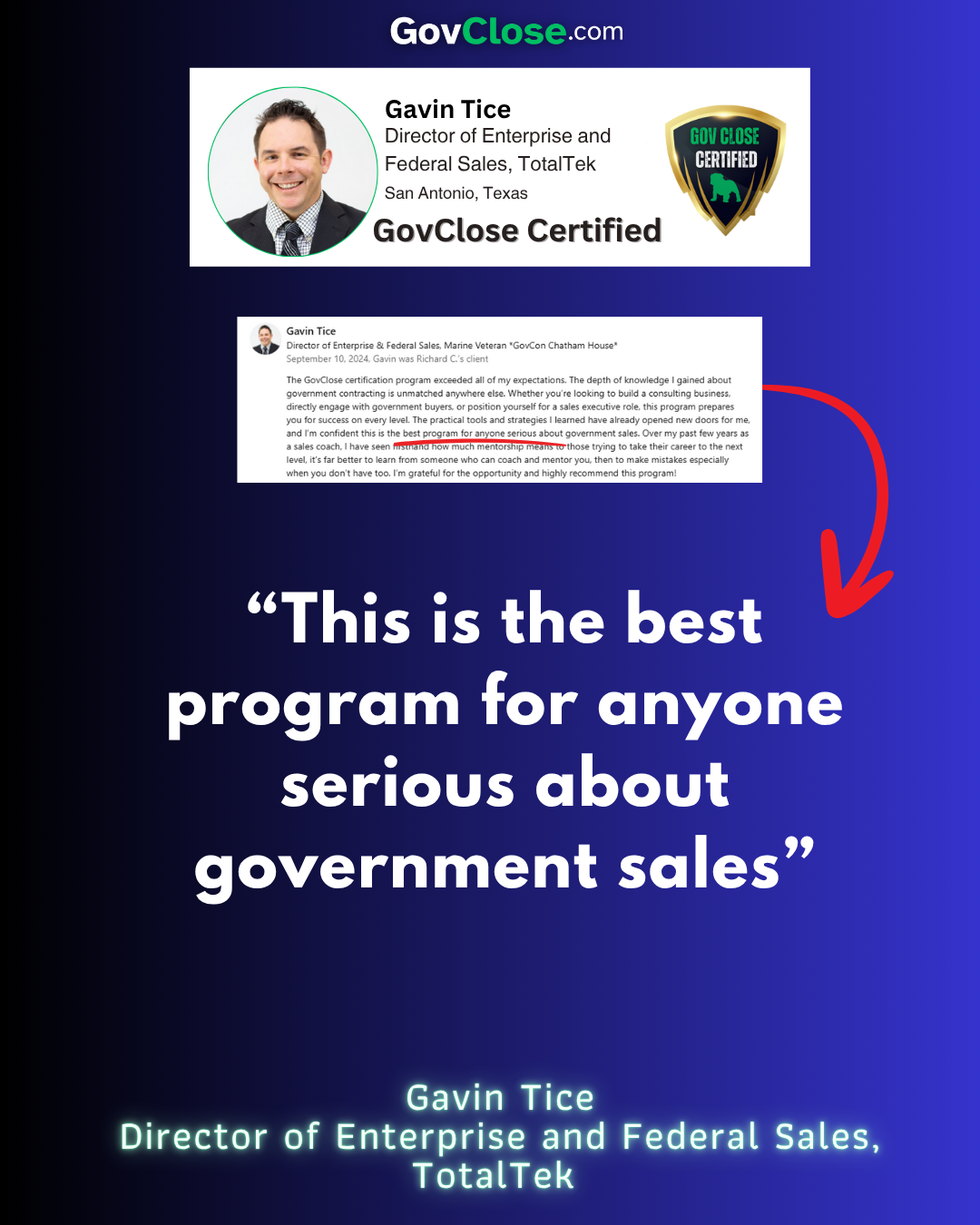
Military Technology Development and Investment (Podcast Transcript)
Jan 22, 2023[00:08] Richard C. Howard: Hey guys, thanks for checking into the DoD Contract Academy podcast. It's where we help small businesses and sales professionals sell products and services to the US. Military and other federal agencies. So I don't get into it too often, but why did we rename our podcast? And it's actually a rename. It used to be government sales momentum for those that have been listening to us for a while. I change it to DoD Contract Academy for a couple of reasons. First of all, when you look at government spending, and if you're hearing this for the first time, the government and you may have heard this before, but the government's the biggest purchaser of goods and services in the world, right? But when you look at that, because they're also the biggest purchaser of small business goods and services in the world. And just looking at 2020 one's numbers, which were again, they're not in front of me right now, but it was around $154,000,000,000 spent on small business contracts.
The government has to buy from small businesses. But when we look at meaning there's a mandate by the Small Business Association or SBA that says, hey, it's usually 23% that they have to spend on small businesses when they have contracting efforts. So each agency fluctuates in how well they achieved that, some under-perform, some over-performed. The military usually over performs in 2021. The military was responsible for over half of the small business contract spending. Of that $154,000,000,000, the US military, more than half. That was army, air Force, Navy, etc. And that's all the other federal agencies combined. So the military did the predominant amount of spending there. The reason we're DoD Contract Academy is though, although our clients and the people listening to the podcast will sell to several agencies, most of them are selling to the military in one way or another. It makes up most of the spending just like it does overall. So focusing on that, it does give you a little bit of extra clarification when we're talking about how we're going to sell to the government because there are some differences.
Although what we talk about on the podcast applies to all the agencies. There's some different language and acronyms with some of the agencies, but they all fall under the Far, the Federal Acquisitions Regulation. So the military buys everything. It buys everything that you can think of where they're basically supporting small towns or cities. I thought today it would be good to talk about just how far back military contracts go when we talk about government spending. Military contracts, military spending absolutely is the spotlight. They're on center stage historically of all of these contracting efforts going back to the Revolutionary War, really in this country, even going back before that to the French Indian War and how we supplied our troops. And that's really what it's about. How do we supply and take care of our men and women in uniform, right when we're fighting battles. All the logistics that goes into that, the technology, the weapon systems that we use, but also it's food and it's clothing and it's transportation and just about everything that you can think of.
All the stuff today that goes into a small military base, maybe just supporting the schools on the base, the golf courses, the streets, the infrastructure. So you get my point of pharmaceuticals. I mean, just about every industry is impacted by this. And I thought it would be good just to talk about because I think it gets forgotten just how important the military spending is to our nation and what has come from that. I'll put out advertisements every now and then for the podcast or for a service that we have through Dodcontract.com. And it's inevitable there's going to be some snarky person on there that will see something about selling to the military and like, oh, these are arms dealers. Or you want to be an arms dealer, or they'll have something negative to say about the government contracting process, when in fact, I can't think of a single weapons manufacturer that I've worked with. It's all been services and products that you wouldn't normally think about. Accounting, legal, maybe some things you would like cybersecurity and different computer related and networking related efforts, radar, you know, those type of things. Office supplies, right? So it really runs the gampet.
But just going back in time and looking at how military spent, because I've been deep diving on some books lately just on the history of federal contracting and looking how different wars we've been in and different engagements and the military investment in technology have developed some of the things that we take for granted today. Because the military and you'll see, if you've heard us talk about SBIR and government investment in innovative technologies with small businesses, you'll know that dual use is a huge component of the government's investment in you. If you have a technology you want to develop or modify, meaning it could be used for the government or for civilian purposes. So I mean, just some of the things that have been developed through military spending that were then translated into how we can use them commercially, how you and I can use them every day, things like the computer, right. US. Military spending responsible for that radar, certainly. And that may seem a little bit more that might make more sense to you, but swept wing aircraft, right? I mean, these are military developments that then turned into how we can use them commercially, right?
Insecticides transistors, antibacterial drugs, the list goes on and on of the things that were developed through military spending and innovation and then really the whole world benefited from a lot of these technologies. Nuclear power is one of them. So we want to make sure that we're looking at the military spending and selling to the government and make it historically accurate, right. So a lot of good comes from government spending, a lot of good comes from the investment they make in technology development and how even though some of these technologies were used to maybe defend the country or win a battle, they can be used to really help humanity and connect all of us, right? So reading through some of the articles that surround our current state and how we're investing in technology, the Department of Defense is continuing to in its rich tradition of being on the cutting edge of technology and the fact that they do invest in small businesses. So if you do have a solution, you can apply for an SBIR contract or there's other ways to kind of garner government investment in what you're selling.
But now some of the things they're interested in hypersonics, quantum computers, quantum science, artificial intelligence, these are all at the top of the list for what they're investing in. And some things they're looking at very specifically, some of them are abroad and you can drive a truck through them. And what I mean by that is a topic could come up that just says hey, we're looking for, I am drastically dumbing this down, but we're looking for innovative solutions that are related or fit into the artificial intelligence subject or quantum science subject. So when you have those and you have something that's related, you can make a submission and see if it is something that the government is interested in and would like to invest in you or your business in.
So I thought today it would just be a good time to talk a little bit about the history and I'm going to bring more of that to you guys talking through the years how the government contracting process has evolved. And you know, like for instance something I read recently, by the way, I read this in a book called History of Government Contracting by James Nagel. This is from the George Washington University. It's a fascinating book and it really, it goes from if you can get your hands on it. I had to really do some searching to get my hands on this one and maybe I'll reach out to him if he's, I don't even know if he's still alive. So I should, I should look into that. But I would love to talk to him and learn a little bit more about this history. But you know, just going back to Revolutionary War times and how they put local businesses on contract to supply our troops and to do the different things that we needed to win the war and in some cases they had a lot more authority than companies have today. I read that for instance, back then they just took a 5% commission and had a lot of, I guess leeway to spend government funding on the different things they thought the troops needed. So certainly the discussion of hey, was there any corruption? Of course there was in every industry there's a little bit of corruption but when I look at government contracting today, there's so many laws in place and regulations to prevent that, even with that 5%. Because if you're just taking a 5% commission on everything you sell the government and you can decide up to a limit how much the government spends, you don't really have an incentive to not spend a lot of money, right?
So just thinking and of course that's not how we do things anymore, but it's interesting to see how it evolved from something like that to the types of contracts we have today, what the process looks like and just how important it was then and how important it is now. So if you are interested, if you haven't started yet, head over to Dodcontract.com. We have free webinar you can watch on the process. We have some programs where we can help you get started selling to the government. And yeah, listen to the podcast, it's free. And if you have any recommendations on people that should be on or any subject matter you'd like to hear about, feel free to reach out to us. We'd love to hear from you. Again, go over to Dodcontracts.com. Please subscribe to this and review the podcast. Share it with your friends. As we are building up our listenership, we have some amazing guests here. We've had a bunch on last year that did really well and we have some more lined up for the year it's and I think you're going to really like what we have coming up, so keep listening. Thanks again and we'll see you next time.
If you enjoyed this episode, you can also check out my Interview with Dr. Kizzy Parks which got a lot of attention as she shares an amazing amount about selling to the government! Kizzy has captured over $50M in Federal Government Contracts and focuses on providing services to the federal government.
Turn Government Contracting Knowledge Into Income
This isn’t a course. It’s a certification and implementation system to help you build a consulting business, land a high-paying sales role, or scale your own company in federal contracting.
We hate SPAM. We will never sell your information, for any reason.


